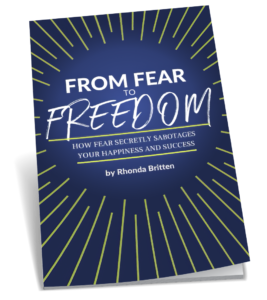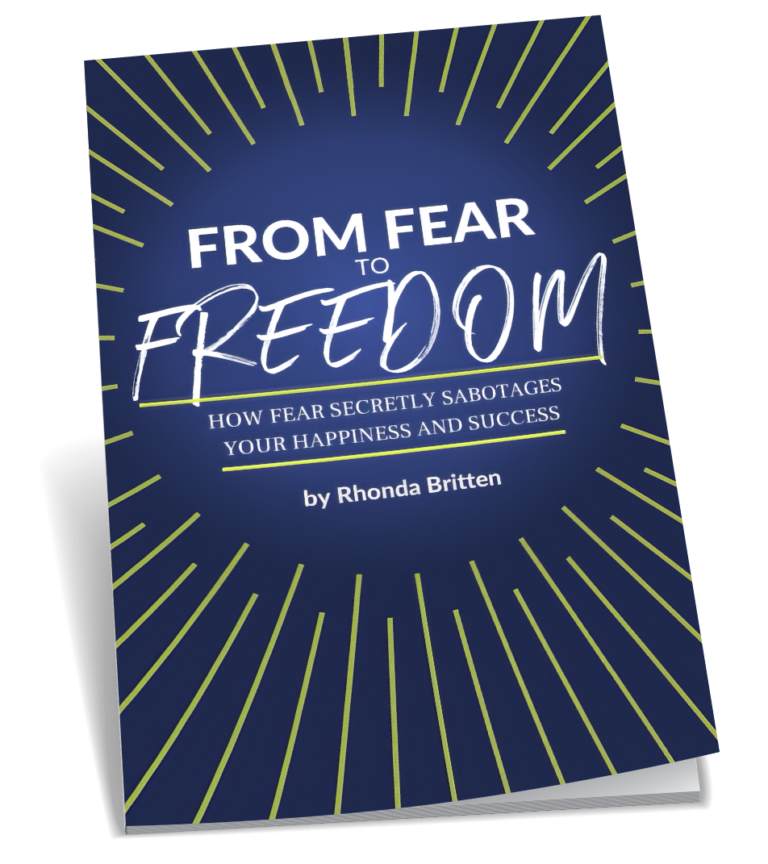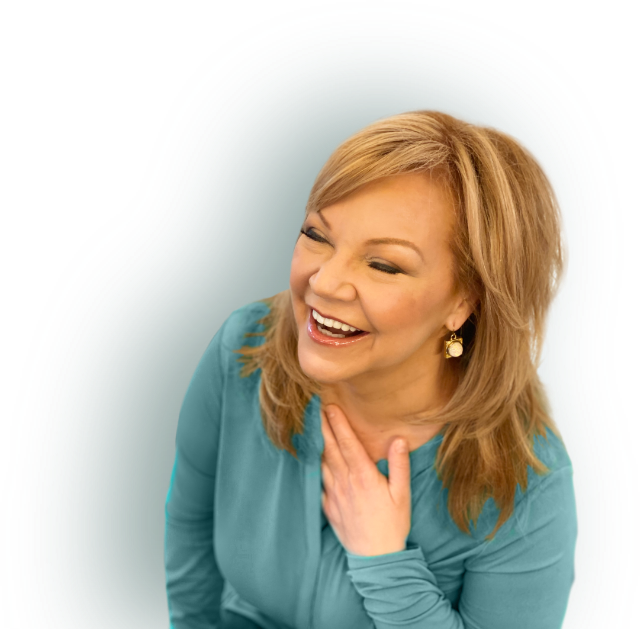There is a critical topic that is required to live a fearless life, and it is so close to my heart. So let’s get to it. Forgiveness. There you have it.
But don’t worry; you don’t have to do it alone because I consider myself a forgiveness expert. Yes—I believe I am an expert in forgiveness because forgiveness is what saved my life.
And I believe it can save yours too.
I get you may not want to forgive. I get that you may not be ready to forgive. And maybe you believe that whoever hurt you doesn’t deserve your forgiveness.
You may even be thinking, “Rhonda, I can’t forgive.” “I won’t forgive.” “It’s impossible to forgive!”

I won’t tell you it will be easy, but I can tell you that putting in the time and effort to undergo the forgiveness process and experience genuine forgiveness will revolutionize your life.
Think of forgiveness as a release valve. When you forgive yourself or others, it’s like all the disappointment and hurt feelings that have been accumulating from the past are released, allowing you to be free to move on unencumbered. Then, you have the space to create a future that is more aligned with your true self. Because, if you’re like me, unforgiveness will make you contort yourself into a pretzel of compromise and stifle your capacity for joy.
Even though you may not want to forgive quite yet, keep reading. You may find that you have a tiny sliver of willingness somewhere within you.
I hope that sliver of willingness will open you up so that you no longer have to carry the burden of your past.
The reward of forgiveness is more freedom and less burden.
The reward of forgiveness is more of you and less of them.
The reward of forgiveness is more of what you want to do and less of what anyone else wants for you.
Thank you for taking this journey with me. You've made a wonderful choice... a brave choice... a FEARLESS choice!
My Long Journey of Forgiveness
Embracing forgiveness was a huge turning point in my life.
I spent years reading all of the books, taking the courses, and going to conferences, and I did gain a little bit each time from all of this work. But before I could truly understand how the power of forgiveness worked, I had to actually forgive.
When I look back on my life, the biggest turning point, the one that made everything I am today possible, was forgiveness. Forgiveness saved my life.
My journey with forgiveness is a storied one. There have been many moments in my life and people in my life that I’ve had to forgive in order to gain back my freedom. And I’m sure there are plenty of these moments and people in your life, too.
I forgave my first boyfriend for cheating on me.
I forgave my relatives for abandoning me and my sisters.
I forgave my ex-husband for telling me he “loved me like a sister.”
I forgave my best friend for leaving me after my first suicide attempt.
I forgave my first business partner who sued me.
I forgave my ex-lover who emotionally abused me.
I forgave my body for gaining weight, and losing weight, and gaining it again.
I forgave my car for breaking down and stranding me in the middle of nowhere.
I forgave the public for making up rumors about me.
I forgave myself for not saving my mother.
And the big one… I forgave my parents.
For anyone who has been a part of Fearless Living or followed along on the blog, you’ll be familiar with my parents’ tragic death.
It was June 15th, Father’s Day, when my father decided to come to the house. He took his gun out, shot my mother twice, turned his gun on me, and then shot himself. For a moment, I believed I would be next. My father had strangled me when I was 12, so although it was surreal, it wasn’t shocking in a way. As sad as that is for me to think about, it wasn’t shocking that I could be next.
How could I forgive something like that? Well, I didn’t for a long, long, LONG time. But not being able to forgive was ruining my life. I became an alcoholic. I was a bad friend. I sabotaged my career. I hated myself. I attempted suicide. I spiraled down a deep, dark hole. I was completely guided by fear, and for so long, forgiveness wasn’t even in my vocabulary.
Now, all of those people I mentioned, did they hurt me? Sure. Did some of them cause me great pain? Yes. For a long time, I hid my resentment. I was angry. I was bitter. And I felt like I had so much anger I could destroy the world. In all honesty, I was afraid to forgive because I thought forgiving meant I was letting those people off the hook for what they did. Forgiving meant I had to be vulnerable and open up my heart after I had closed it off.
But what I know now, what I have learned, is that it was only me I was hurting by not forgiving.
I had to decide to forgive. Not only all of those people, but myself, too. I had to decide to forgive myself.
It was not easy. It took 20 years for me to forgive my parents. 20 years. For 20 years, my life was sidelined, and I was confused. I self-sabotaged. I was lost.
Not being able to forgive steals your energy. It steals your heart. It steals your passions and your spark.
The hardest person to forgive wasn’t my father for murdering my mother or my mother for allowing him to come over that day. It was myself. I had to find the strength to forgive myself. What my father did was unforgivable, but what I did to myself over those 20 years of unforgiveness was unforgivable too.
I could have found forgiveness sooner. I could have changed my path sooner. But that wasn’t my journey. We are all on a different journey and a different divine schedule. I’ve gone through many phases of forgiveness, and I’m still not done with my journey. And neither are you.
Wherever you currently are in your journey—it’s okay. What matters most is that you are here today reading this article, participating in Fearless Living, and, most importantly, showing a willingness toward forgiveness. Opening your heart like you are right now is not easy, but the rewards of freedom are worth every bit of hard work.
Before we move on to how to forgive and the steps you can take to work toward forgiveness, let me first share why it’s so hard to forgive. Because it is so hard. It may even be the hardest thing you do in your whole life. So if you feel like you can't forgive or like forgiveness is still so far away for you, know that what you’re working on is incredibly difficult.
Why Is Forgiveness So Hard?

Reliving the Past
Forgiveness makes us relive the past. To forgive, you have to experience all those negative feelings. All over again, you have to experience the pain—the pain and deep anger you’ve pushed down inside of you. And who wants to do that, especially after you’ve worked so hard to forget about it and bury those thoughts?
Choosing to forgive means choosing to venture deep inside your trauma. And this isn’t easy—far from it.
Superiority
As the hurt person, you may be holding on to your grudge and what someone did to you in order to feel superior to them. You have moral virtue. You’re better than them—just look at what they did to you. You would never do that to someone. What they did, and what you wouldn’t do, makes you feel morally superior. You may not want to lose that place of power.
Vulnerability
Forgiving someone means breaking down the walls you’ve built up to protect yourself, leaving you vulnerable. Opening up your heart means those hurt feelings could temporarily resurface. But they need to in order for you to release them.
The Victim Story
Being the victim gives you an excuse to not pursue your dreams. It gives you someone to blame for all of the problems you see in your life. Being a victim means you keep making excuses about why you can't do something.
No matter what you do, you’re not really responsible for it. You’re a victim of your circumstances and of someone else’s actions. I know, I’ve been there—it’s a comfortable place to be!
When you forgive, you move beyond that safe space. Even though it’s comfortable, it’s holding you back. It keeps you from evolving and moving on with your life.
When we acknowledge that we’re behaving like a victim, we can get off of the Wheel of Fear. The more we tell ourselves the truth with compassion, the more that we can take responsibility and choose a new way—you can break the cycle of sadness, self-destruction, forced apathy, and inactivity with forgiveness.
How to Forgive Someone Who Isn't Sorry
1. Understand Forgiveness Is for You
Forgiveness has everything to do with you. When you think of forgiveness, like most people, I bet you’re thinking forgiveness has to do with one person, one event, or one experience. You probably think forgiveness means you have to be friends with someone who caused you tremendous pain, left you deeply hurt, or potentially ruined your life. But that’s wrong. Forgiving someone doesn’t mean you have to invite them back into your life.
Folks, let me say it again: Forgiveness has everything to do with you. It’s your personal experience, and it doesn’t mean all is forgotten. Forgiveness is about setting yourself free. It’s about letting go of the burden that’s weighing you down, affecting your mental health, and keeping you in a prison of resentment, fear, hurt feelings, and excuses.
As we work through forgiveness in this article, remember that you are here and working hard to forgive for your own benefit—not anyone else’s.
2. Show Yourself Compassion and Be Willing
Thank you for coming here to say, “I am willing.” It’s an open heart and a willing heart that will help you on your path. I can show you the path, but I can’t make you walk it. I can’t make you do the work. And I never would! Forgiving people must be your choice. Forgiveness must come from your willingness to make a change. You must decide.
Decide that you're willing to forgive. Yes… the key word there is DECIDE. You decide. Decide that you are willing to forgive. None of the work you put in and nothing I can say will do you any good if you yourself are not willing. Willingness is the first step. When you are willing, anything is possible—even forgiveness.
But it’s hard! Trust me—I know that. It’s not easy to be willing. So, let’s add an Intention Statement. Intentions are a pledge you make to yourself, and the key words of an Intention Statement are WILLING and PRACTICE.
Repeat after me:
I am willing to practice forgiveness.
I am willing to practice forgiving the people who have wronged me.
I am willing to practice forgiving myself.
I am willing to practice showing compassion to myself.
Whatever your Intention Statements look like, make sure they are proactive. Make sure they are rooted in the present. Make sure they are POSITIVE. Focus on what you WANT, not what you want to stop. We’re not here sitting at our computers or our phones or our tablets stewing in regret and negativity. Absolutely not! You are on your fearless journey. You’re learning. You are telling yourself that you are WILLING to PRACTICE.
And with your willingness, remember to show yourself some compassion, too. The path to forgiveness is long. It’s hard. And it’s far, far from perfect. You’re going to stumble. You’re going to fall flat on your face. And that’s okay. Being angry at yourself or critical of yourself doesn’t help. If you saw a little boy or girl trip and fall on the street, would you ridicule them for not looking where they’re going, or would you help them up and tell them everything will be okay? Practice showing that same compassion to yourself. Be gentle with yourself during this process.
3. Fearbuster Exercise™: Forgiveness List
It’s time for a Fearbuster Exercise! Start by answering the following two questions. For best results, make sure to actually record your answers in a journal or computer document. (Psst! With a Fearless You membership, you’ll gain access to my Freedom of Forgiveness course, as well as the companion Freedom of Forgiveness Workbook to help you follow along and complete each Fearbuster Exercise.)
Who in your life do you know or suspect you must forgive, regardless of if they have
changed their behavior, acknowledged your pain, or said they were sorry?
What will you gain if you forgive this person/group/organization?
Having trouble narrowing down your list? What about some of these questions? Who or what situations come to mind?
- Who takes up space in your mind? Who lives there rent-free?
- Who haunts your thoughts?
- Who do you want to punish (if you could)?
- Who are you holding a grudge against?
- What situations from your past keep you hanging on to resentment?
- Is there someone in your life who treats you or has treated you poorly?
- Who causes you suffering?
Now, based on your answers to these questions, make a list of a minimum of 10 people, things, or events to craft a Forgiveness List.
If you forgave any or all of your Forgiveness List, how would your life change?
For the last part of this exercise, narrow down your list. Pick the top three people that, if you decided to forgive them, would cause a radical change in how you see the world, yourself, and what’s possible. Which three from your list would make the most impact on your life?
Again, write these out—don't just think of them in your head.
What do YOU have to gain from forgiving?
4. Fearbuster Exercise™: Willingness Practice
Even if they have not changed, you can still forgive. Remember: Forgiveness has everything to do with you. It has nothing to do with the other person. It doesn’t mean inviting them back into your life. It doesn’t mean forgetting about what they did. It’s about acknowledging their actions and their effect on your life and then moving on.
I believe forgiveness is a daily activity. Anytime your heart is closed off, it’s a call for forgiveness.
Forgiveness does not need you to be perfect or have impeccable moral virtues for it to work. Our lack of forgiveness stems from our judgment of ourselves and of others. We’re judging if we can do it or not and if they are worth forgiving. And if one of the ways you feel powerful is by being angry, it’s going to be really tough to forgive.
Write down the name of the person, group, or organization you’d like to forgive… one day. Now, what’s the first thing that comes to your mind when you think about them? Be as truthful as possible. Write that down in the left hand column in one sentence or phrase. Then, quickly, move to the right hand column and write down the words “I am willing to forgive you.” Next, quickly move back to the left hand column and write down how you think or feel about them now.
The idea is to go back and forth until you are drained of things to say, one sentence or phrase at a time. Consider this a dialogue between how you feel about them in the left hand column and what you’d like to move towards in the right hand column. You may need more paper! In the right hand column, you will continue to write the same thing over and over. If that proves too difficult, you can write, “I am willing to be willing to forgive you.”
| When you think of this person or situation, what thoughts come up? | Repeat this phrase after each sentence: “I am willing to forgive you” or “I am willing to be willing to forgive you.” |
5. Fearbuster Exercise™: The Forgiveness Letter
I know you may not feel 100% ready yet, but now is the time to write a Forgiveness Letter to the person you want to—someday—forgive. The purpose of your Forgiveness Letter is to say whatever it is you need to about the situation. You won’t send this letter. In fact, feel free to rip it up or burn it after you write it. BUT before you make that choice, read it out loud to yourself. Claim the words on the page.
Claiming is part of releasing. Important note: DO NOT MAIL OR SHARE THIS with
the person you desire to release. This Forgiveness Letter is for your healing—not theirs. It’s for your eyes only.
You don't have to use these, but you might start with or include phrases like:
- What hurt me most was.....
- What scared me was...
- What I really needed was...
- What I most regret is...
- I take responsibility for…
- I blame myself for…
Take responsibility for your actions as well. What can you do to take responsibility for any of your part?
Next, it’s time to speak your intention. It's important that you write this intention down and that you speak it out loud in order to let it go.
State your name and claim that you are releasing yourself from the situation.
I ____________ am willing to release __________________________.
Repeat that a few times out loud. How does that feel?
Know That Forgiveness Is a Journey
You’ve come a long way. Good job! You’re taking the first steps, and I think that’s amazing. Remember: Rome wasn’t built in a day. When someone truly hurts you, you can’t forgive quickly. Forgiveness is an ongoing journey. It’s not like flicking a light switch. It’s not instantaneous. You know the path forward, but it’s a long path, and you’re going to be walking it for a long time. You may not even feel ready to walk it yet. But you know where you’re going, and I applaud you for that.
I didn’t forgive my parents all in one night. It wasn't one sudden moment. Sure, I’ve made a lot of great progress and taken huge leaps forward, but there's always further to go. I keep unraveling new layers and continuing to learn.
To find forgiveness is a journey of compassion and self-discovery. Are you willing to walk it with me?
The Freedom of Forgiveness With Fearless You

Continue your forgiveness journey on the Fearless Living blog, including How to Forgive Even When It Feels Impossible, where I break down the four stages of the forgiveness process.
Start living the life your soul intended™ by signing up for Fearless You, your one-stop-shop for everything you need to master fear, build unshakable confidence, and find the power to forgive.
We have two courses dedicated to forgiveness on Fearless You: Freedom of Forgiveness and Forgive the Unforgivable, but the membership also gives you access to ALL of my premium courses—courses that have been proven over 25 years, with tens of thousands of students. The courses use neuroscience breakthroughs to help you create real, lasting change. You’ll also get the chance to work with me and my coaches every month! See you there!
Curious to learn more about how to forgive and how to be fearless? Contact me here with any questions, doubts, or issues you're currently experiencing. Let’s start your journey of forgiveness together.
There is a critical topic that is required to live a fearless life, and it is so close to my heart. So let’s get to it. Forgiveness. There you have it.
But don’t worry; you don’t have to do it alone because I consider myself a forgiveness expert. Yes—I believe I am an expert in forgiveness because forgiveness is what saved my life.
And I believe it can save yours too.
I get you may not want to forgive. I get that you may not be ready to forgive. And maybe you believe that whoever hurt you doesn’t deserve your forgiveness.
You may even be thinking, “Rhonda, I can’t forgive.” “I won’t forgive.” “It’s impossible to forgive!”

I won’t tell you it will be easy, but I can tell you that putting in the time and effort to undergo the forgiveness process and experience genuine forgiveness will revolutionize your life.
Think of forgiveness as a release valve. When you forgive yourself or others, it’s like all the disappointment and hurt feelings that have been accumulating from the past are released, allowing you to be free to move on unencumbered. Then, you have the space to create a future that is more aligned with your true self. Because, if you’re like me, unforgiveness will make you contort yourself into a pretzel of compromise and stifle your capacity for joy.
Even though you may not want to forgive quite yet, keep reading. You may find that you have a tiny sliver of willingness somewhere within you.
I hope that sliver of willingness will open you up so that you no longer have to carry the burden of your past.
The reward of forgiveness is more freedom and less burden.
The reward of forgiveness is more of you and less of them.
The reward of forgiveness is more of what you want to do and less of what anyone else wants for you.
Thank you for taking this journey with me. You've made a wonderful choice... a brave choice... a FEARLESS choice!
My Long Journey of Forgiveness
Embracing forgiveness was a huge turning point in my life.
I spent years reading all of the books, taking the courses, and going to conferences, and I did gain a little bit each time from all of this work. But before I could truly understand how the power of forgiveness worked, I had to actually forgive.
When I look back on my life, the biggest turning point, the one that made everything I am today possible, was forgiveness. Forgiveness saved my life.
My journey with forgiveness is a storied one. There have been many moments in my life and people in my life that I’ve had to forgive in order to gain back my freedom. And I’m sure there are plenty of these moments and people in your life, too.
I forgave my first boyfriend for cheating on me.
I forgave my relatives for abandoning me and my sisters.
I forgave my ex-husband for telling me he “loved me like a sister.”
I forgave my best friend for leaving me after my first suicide attempt.
I forgave my first business partner who sued me.
I forgave my ex-lover who emotionally abused me.
I forgave my body for gaining weight, and losing weight, and gaining it again.
I forgave my car for breaking down and stranding me in the middle of nowhere.
I forgave the public for making up rumors about me.
I forgave myself for not saving my mother.
And the big one… I forgave my parents.
For anyone who has been a part of Fearless Living or followed along on the blog, you’ll be familiar with my parents’ tragic death.
It was June 15th, Father’s Day, when my father decided to come to the house. He took his gun out, shot my mother twice, turned his gun on me, and then shot himself. For a moment, I believed I would be next. My father had strangled me when I was 12, so although it was surreal, it wasn’t shocking in a way. As sad as that is for me to think about, it wasn’t shocking that I could be next.
How could I forgive something like that? Well, I didn’t for a long, long, LONG time. But not being able to forgive was ruining my life. I became an alcoholic. I was a bad friend. I sabotaged my career. I hated myself. I attempted suicide. I spiraled down a deep, dark hole. I was completely guided by fear, and for so long, forgiveness wasn’t even in my vocabulary.
Now, all of those people I mentioned, did they hurt me? Sure. Did some of them cause me great pain? Yes. For a long time, I hid my resentment. I was angry. I was bitter. And I felt like I had so much anger I could destroy the world. In all honesty, I was afraid to forgive because I thought forgiving meant I was letting those people off the hook for what they did. Forgiving meant I had to be vulnerable and open up my heart after I had closed it off.
But what I know now, what I have learned, is that it was only me I was hurting by not forgiving.
I had to decide to forgive. Not only all of those people, but myself, too. I had to decide to forgive myself.
It was not easy. It took 20 years for me to forgive my parents. 20 years. For 20 years, my life was sidelined, and I was confused. I self-sabotaged. I was lost.
Not being able to forgive steals your energy. It steals your heart. It steals your passions and your spark.
The hardest person to forgive wasn’t my father for murdering my mother or my mother for allowing him to come over that day. It was myself. I had to find the strength to forgive myself. What my father did was unforgivable, but what I did to myself over those 20 years of unforgiveness was unforgivable too.
I could have found forgiveness sooner. I could have changed my path sooner. But that wasn’t my journey. We are all on a different journey and a different divine schedule. I’ve gone through many phases of forgiveness, and I’m still not done with my journey. And neither are you.
Wherever you currently are in your journey—it’s okay. What matters most is that you are here today reading this article, participating in Fearless Living, and, most importantly, showing a willingness toward forgiveness. Opening your heart like you are right now is not easy, but the rewards of freedom are worth every bit of hard work.
Before we move on to how to forgive and the steps you can take to work toward forgiveness, let me first share why it’s so hard to forgive. Because it is so hard. It may even be the hardest thing you do in your whole life. So if you feel like you can't forgive or like forgiveness is still so far away for you, know that what you’re working on is incredibly difficult.
Why Is Forgiveness So Hard?

Reliving the Past
Forgiveness makes us relive the past. To forgive, you have to experience all those negative feelings. All over again, you have to experience the pain—the pain and deep anger you’ve pushed down inside of you. And who wants to do that, especially after you’ve worked so hard to forget about it and bury those thoughts?
Choosing to forgive means choosing to venture deep inside your trauma. And this isn’t easy—far from it.
Superiority
As the hurt person, you may be holding on to your grudge and what someone did to you in order to feel superior to them. You have moral virtue. You’re better than them—just look at what they did to you. You would never do that to someone. What they did, and what you wouldn’t do, makes you feel morally superior. You may not want to lose that place of power.
Vulnerability
Forgiving someone means breaking down the walls you’ve built up to protect yourself, leaving you vulnerable. Opening up your heart means those hurt feelings could temporarily resurface. But they need to in order for you to release them.
The Victim Story
Being the victim gives you an excuse to not pursue your dreams. It gives you someone to blame for all of the problems you see in your life. Being a victim means you keep making excuses about why you can't do something.
No matter what you do, you’re not really responsible for it. You’re a victim of your circumstances and of someone else’s actions. I know, I’ve been there—it’s a comfortable place to be!
When you forgive, you move beyond that safe space. Even though it’s comfortable, it’s holding you back. It keeps you from evolving and moving on with your life.
When we acknowledge that we’re behaving like a victim, we can get off of the Wheel of Fear. The more we tell ourselves the truth with compassion, the more that we can take responsibility and choose a new way—you can break the cycle of sadness, self-destruction, forced apathy, and inactivity with forgiveness.
How to Forgive Someone Who Isn't Sorry
1. Understand Forgiveness Is for You
Forgiveness has everything to do with you. When you think of forgiveness, like most people, I bet you’re thinking forgiveness has to do with one person, one event, or one experience. You probably think forgiveness means you have to be friends with someone who caused you tremendous pain, left you deeply hurt, or potentially ruined your life. But that’s wrong. Forgiving someone doesn’t mean you have to invite them back into your life.
Folks, let me say it again: Forgiveness has everything to do with you. It’s your personal experience, and it doesn’t mean all is forgotten. Forgiveness is about setting yourself free. It’s about letting go of the burden that’s weighing you down, affecting your mental health, and keeping you in a prison of resentment, fear, hurt feelings, and excuses.
As we work through forgiveness in this article, remember that you are here and working hard to forgive for your own benefit—not anyone else’s.
2. Show Yourself Compassion and Be Willing
Thank you for coming here to say, “I am willing.” It’s an open heart and a willing heart that will help you on your path. I can show you the path, but I can’t make you walk it. I can’t make you do the work. And I never would! Forgiving people must be your choice. Forgiveness must come from your willingness to make a change. You must decide.
Decide that you're willing to forgive. Yes… the key word there is DECIDE. You decide. Decide that you are willing to forgive. None of the work you put in and nothing I can say will do you any good if you yourself are not willing. Willingness is the first step. When you are willing, anything is possible—even forgiveness.
But it’s hard! Trust me—I know that. It’s not easy to be willing. So, let’s add an Intention Statement. Intentions are a pledge you make to yourself, and the key words of an Intention Statement are WILLING and PRACTICE.
Repeat after me:
I am willing to practice forgiveness.
I am willing to practice forgiving the people who have wronged me.
I am willing to practice forgiving myself.
I am willing to practice showing compassion to myself.
Whatever your Intention Statements look like, make sure they are proactive. Make sure they are rooted in the present. Make sure they are POSITIVE. Focus on what you WANT, not what you want to stop. We’re not here sitting at our computers or our phones or our tablets stewing in regret and negativity. Absolutely not! You are on your fearless journey. You’re learning. You are telling yourself that you are WILLING to PRACTICE.
And with your willingness, remember to show yourself some compassion, too. The path to forgiveness is long. It’s hard. And it’s far, far from perfect. You’re going to stumble. You’re going to fall flat on your face. And that’s okay. Being angry at yourself or critical of yourself doesn’t help. If you saw a little boy or girl trip and fall on the street, would you ridicule them for not looking where they’re going, or would you help them up and tell them everything will be okay? Practice showing that same compassion to yourself. Be gentle with yourself during this process.
3. Fearbuster Exercise™: Forgiveness List
It’s time for a Fearbuster Exercise! Start by answering the following two questions. For best results, make sure to actually record your answers in a journal or computer document. (Psst! With a Fearless You membership, you’ll gain access to my Freedom of Forgiveness course, as well as the companion Freedom of Forgiveness Workbook to help you follow along and complete each Fearbuster Exercise.)
Who in your life do you know or suspect you must forgive, regardless of if they have
changed their behavior, acknowledged your pain, or said they were sorry?
What will you gain if you forgive this person/group/organization?
Having trouble narrowing down your list? What about some of these questions? Who or what situations come to mind?
- Who takes up space in your mind? Who lives there rent-free?
- Who haunts your thoughts?
- Who do you want to punish (if you could)?
- Who are you holding a grudge against?
- What situations from your past keep you hanging on to resentment?
- Is there someone in your life who treats you or has treated you poorly?
- Who causes you suffering?
Now, based on your answers to these questions, make a list of a minimum of 10 people, things, or events to craft a Forgiveness List.
If you forgave any or all of your Forgiveness List, how would your life change?
For the last part of this exercise, narrow down your list. Pick the top three people that, if you decided to forgive them, would cause a radical change in how you see the world, yourself, and what’s possible. Which three from your list would make the most impact on your life?
Again, write these out—don't just think of them in your head.
What do YOU have to gain from forgiving?
4. Fearbuster Exercise™: Willingness Practice
Even if they have not changed, you can still forgive. Remember: Forgiveness has everything to do with you. It has nothing to do with the other person. It doesn’t mean inviting them back into your life. It doesn’t mean forgetting about what they did. It’s about acknowledging their actions and their effect on your life and then moving on.
I believe forgiveness is a daily activity. Anytime your heart is closed off, it’s a call for forgiveness.
Forgiveness does not need you to be perfect or have impeccable moral virtues for it to work. Our lack of forgiveness stems from our judgment of ourselves and of others. We’re judging if we can do it or not and if they are worth forgiving. And if one of the ways you feel powerful is by being angry, it’s going to be really tough to forgive.
Write down the name of the person, group, or organization you’d like to forgive… one day. Now, what’s the first thing that comes to your mind when you think about them? Be as truthful as possible. Write that down in the left hand column in one sentence or phrase. Then, quickly, move to the right hand column and write down the words “I am willing to forgive you.” Next, quickly move back to the left hand column and write down how you think or feel about them now.
The idea is to go back and forth until you are drained of things to say, one sentence or phrase at a time. Consider this a dialogue between how you feel about them in the left hand column and what you’d like to move towards in the right hand column. You may need more paper! In the right hand column, you will continue to write the same thing over and over. If that proves too difficult, you can write, “I am willing to be willing to forgive you.”
| When you think of this person or situation, what thoughts come up? | Repeat this phrase after each sentence: “I am willing to forgive you” or “I am willing to be willing to forgive you.” |
5. Fearbuster Exercise™: The Forgiveness Letter
I know you may not feel 100% ready yet, but now is the time to write a Forgiveness Letter to the person you want to—someday—forgive. The purpose of your Forgiveness Letter is to say whatever it is you need to about the situation. You won’t send this letter. In fact, feel free to rip it up or burn it after you write it. BUT before you make that choice, read it out loud to yourself. Claim the words on the page.
Claiming is part of releasing. Important note: DO NOT MAIL OR SHARE THIS with
the person you desire to release. This Forgiveness Letter is for your healing—not theirs. It’s for your eyes only.
You don't have to use these, but you might start with or include phrases like:
- What hurt me most was.....
- What scared me was...
- What I really needed was...
- What I most regret is...
- I take responsibility for…
- I blame myself for…
Take responsibility for your actions as well. What can you do to take responsibility for any of your part?
Next, it’s time to speak your intention. It's important that you write this intention down and that you speak it out loud in order to let it go.
State your name and claim that you are releasing yourself from the situation.
I ____________ am willing to release __________________________.
Repeat that a few times out loud. How does that feel?
Know That Forgiveness Is a Journey
You’ve come a long way. Good job! You’re taking the first steps, and I think that’s amazing. Remember: Rome wasn’t built in a day. When someone truly hurts you, you can’t forgive quickly. Forgiveness is an ongoing journey. It’s not like flicking a light switch. It’s not instantaneous. You know the path forward, but it’s a long path, and you’re going to be walking it for a long time. You may not even feel ready to walk it yet. But you know where you’re going, and I applaud you for that.
I didn’t forgive my parents all in one night. It wasn't one sudden moment. Sure, I’ve made a lot of great progress and taken huge leaps forward, but there's always further to go. I keep unraveling new layers and continuing to learn.
To find forgiveness is a journey of compassion and self-discovery. Are you willing to walk it with me?
The Freedom of Forgiveness With Fearless You

Continue your forgiveness journey on the Fearless Living blog, including How to Forgive Even When It Feels Impossible, where I break down the four stages of the forgiveness process.
Start living the life your soul intended™ by signing up for Fearless You, your one-stop-shop for everything you need to master fear, build unshakable confidence, and find the power to forgive.
We have two courses dedicated to forgiveness on Fearless You: Freedom of Forgiveness and Forgive the Unforgivable, but the membership also gives you access to ALL of my premium courses—courses that have been proven over 25 years, with tens of thousands of students. The courses use neuroscience breakthroughs to help you create real, lasting change. You’ll also get the chance to work with me and my coaches every month! See you there!
Curious to learn more about how to forgive and how to be fearless? Contact me here with any questions, doubts, or issues you're currently experiencing. Let’s start your journey of forgiveness together.







